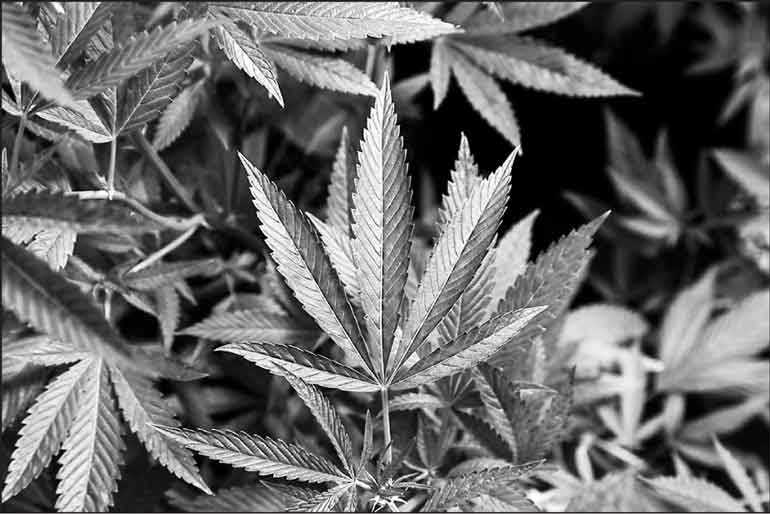Wednesday Mar 04, 2026
Wednesday Mar 04, 2026
Saturday, 7 December 2019 00:02 - - {{hitsCtrl.values.hits}}

Cannabis leaf
‘Common Heritage’ was the theme at the symposium organised by the Royal Asiatic Society of Sri Lanka (RASSL) on 30 November to celebrate its 175th anniversary. The themes that were presented were: Indigenous Medicine, Healthcare and wellbeing in pre-colonial Sri Lanka, Food ethics and conscious eating, ancient technological innovations of Sri Lanka and Influence of Buddhist values in the evolution of Lankan society.
This article features only a segment of the event but this page shall run a series of articles based on the symposium and interviews with the speakers. This is as part of a bid to promote Sri Lanka’s indigenous knowledge in many fields which is one objectives of this page and for which we are currently gathering from throughout the country, including the north and the east, diverse aspects of indigenous knowledge that is the pre-colonial heritage of Sri Lanka. The objective is to help Sri Lankan put these aspects of knowledge into everyday practice to lead a life that is harmonious with nature and have no adverse effects to the consumer or the planet.
The first topic presented at the RASSL symposium was Indigenous Medicine, Health Care and Well-being in pre Colonial Lanka where the speakers were Dr. Swarna Kaluthota, Deputy Director, Bandaranaike Memorial Ayurvedic Research Institute and Dr. Vajira Seneviratne, senior scientist at the same institution. They summarised all the nature based medicines used in ancient times; plants (where every part of the plant had a medicinal significance), gems and other elements of earth that were used for curative purposes.
Dr. Seneviratne sought to break the theory rampant among some academics that King Ravana was a ‘myth’ and referred to him as one of the greatest physicians of Lanka who had perfected the art of ‘Rasa medicine.’ Dr. Seneviratne also referred to the Mihintale hospital; which he categorised as the first ancient hospital built in the world, some 1,500 years ago and presented photographs of remains of the hospital that showed complex water drainage systems and body shaped stone structures used for healing purposes.
Among the most important points of the presentation was the central role the Cannabis (Kansa) plant played in medicine in pre Colonial times and it was emphasised that the outlawing of the plant was done by the Colonists in order to sell their arrack and tobacco.
“One is now fearful even to talk of Kansa which is portrayed as a terrible poison and therefore illegal,” Dr. Seneviratne pointed out, stating that the name ‘ganja’ was given to portray it in a cheap and suspect light.
“Cannabis (Kansa) was put under the list of poisons after the Colonialists introduced the Dangerous Drug Ordinance, so that they can sell their arrack and cigarettes.” To prove his statements he laid before the audience the many instances the Cannabis leaf was used for medicinal purposes, including for pregnant and lactating mothers to heal them of fevers and overall discomfort felt during pregnancy. It was stressed that in all the pre colonial use of kansa as one of the central plants in native medicine, that there had never been any sign of addiction by any patient.
Dr. Seneviratne’s presentation should ideally belong in the computers of the policy makers of this country who have since 1948 been blind to the fact that they are following the prototype set by foreigners who did not and do not want Sri Lanka to reclaim its lost identity. Because of this, policies like those pertaining to agriculture and climate change remain influenced by Western interests to benefit their industries whether it is the pesticide or the food industry.
Those trained in Western food and nutrition models such as Dr. Damayanthi Perera, who made their presentations at the symposium, pointed out that the Western economics, agriculture and food and nutrition models have failed to serve humanity but have served the interest of few large corporations and business tycoons. In support of this statement she pointed out there is documented evidence that Western consumers are suffering from Non-Communicable Deceases (NCD) and children are dying before their parents in the Western world.
The discussions that ensued with active participation of the audience focused on agriculture techniques used during the time of the kings, that worked with the eco system and not against it and where no pesticide or artificial fertilizer was needed.
Ranjith Seneviratne, an 83 year ‘young’ person who spoke in a booming voice without the aid of a mike (which others half his age could not match) spoke of the pesticide, fertiliser and hybrid seed necessity myth, declaring that he grows all his vegetables in his Colombo land, the extent of which is 20 perches.
“I follow what the ancient kings of Lanka followed. I do not burn a single leaf. All the leaves that fall from my trees go back to the earth, providing rich nutrients for the soil. If there is food waste in the kitchen I put it back to the soil for the worms so that the soil is nourished,” Ranjith Seneviratne said and also significantly called for the setting up of a ‘Heritage University’.
This page will continue next week the rest of the deliberations made at the symposium and feature excerpts of interviews with the panellists.